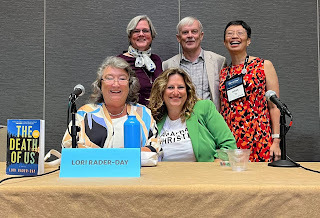Martin Edwards's Blog, page 31
January 12, 2024
Forgotten Book - The Murders of Mrs Austin and Mrs Beale
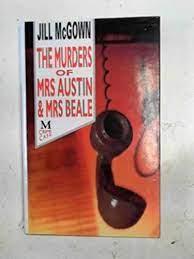
I find with some astonishment that in the course of over three thousand posts on this blog, I don't seem to have mentioned Jill McGown. Time to put that right. I read a number of her books (including a stand-alone published as by Elizabeth Chaplin) during the 80s and 90s. I only had one proper conversation with her, at a festival in Manchester in the late 90s, when I found her very pleasant. She also inscribed a number of books to me. It was with some shock in 2007 that I learned she'd died at the age of 59.
Jill wrote a good series about a cop duo, Lloyd and Judy Hill, who were in a relationship. A TV film was made in 2001, starring Philip Glenister and Michelle Collins, but it didn't make an impression, and there was no series. A good example of the reality that TV adaptation doesn't necessarily bring a writer fame or huge fortune. She also wrote several non-series books, while the Chaplin novel, which I ought to re-read, struck me as an attempt to move into the territory of psychological suspense in which, at the time, Minette Walters reigned supreme in Britain.
I was tempted to re-read Jill's 1991 novel The Murders of Mrs Austin and Mrs Beale by a discussion of her work by Barry Pike in CADS. He described the novel as a tour de force, although my own recollection is that I preferred her next novel, The Other Woman. In this one, Judy has just gained promotion and the dynamics of her relationship with Lloyd are changing subtly.
There's a good surprise at the end of the book, but overall I feel it's an example of her competence rather than a masterpiece. I say this mainly because the central story relates to the interlocking relationships between three couples, and I didn't find any of the individuals engaging. The mood is rather drab and after the early deaths of two women, there is an awful lot of talk. So, not the best example of Jill McGown's work in my opinion, but a sound mystery and a reminder that she is a writer who definitely doesn't deserve to be forgotten.
January 10, 2024
Changing Direction - guest blog by Simon Dinsdale

Simon Dinsdale is a retired murder detective - and a very successful one - who has turned to writing crime fiction. His first novel, Dark Shadow, is out now, and his journey from one career to another makes an interesting story, in my opinion. So I invited him to contribute a guest blog post about that journey. Here it is, and because Simon is a good storyteller, it has a great last line!
'In April 2010, I retiredfrom Essex police. I enjoyed my twenty-seven years as a detective and had risento senior rank. During that time, I encountered and investigated the very worsthumanity is capable of and saw things no one should see or suffer. All thisexperience has given me a fund of stories to tell, and not all of them tall.
My retirement plan was straightforward. To fulfila long-held ambition and write the book I had been itching to start but never hadthe time for.
I set myself two objectives. To sign apublishing contract and be accepted into the Crime Writers Association. With anOU creative writing course under my belt and a fully formed character and plot readyto go, what could stop me?
My knowledge of police procedure, forensicsand how to investigate a murder inspires my writing, although there is, ofcourse, a healthy dollop of poetic licence.
I soon discovered things weren’t as roundedas I thought. Early drafts were greeted by readers with an embarrassed smileand advice to not write it like a police report. First submissions to literaryagent slush piles were rejected at lightning speed.
As time went on, self-doubt crept in, and Ioccasionally considered giving up. But I am passionate about my stories andenjoy the process, so I persevered. But continued rejection takes its toll.
Then COVID hit, the dreaded lockdownfollowed, and my luck changed. Through a mutual contact Martin Edwards and Iformed a double act as we delivered a series of lectures together on Zoom.Martin enthralled the audience with his encyclopaedic knowledge of crimefiction, and I followed with my experience of real murder investigations. Whenhe discovered I was an aspiring crime writer Martin was full of interest. He gaveme sage advice, practical assistance and gently encouraged me to not give upand self-publish.
I took his advice, persevered, and signedthat elusive publishing contract with Sharpe Books last year. My first book,Dark Shadow has now been released. It follows the adventures of Christian Dane,a Senior Investigating Officer, as he hunts down the ruthless killer of fivemen. Along the way, he encounters trials, tribulations and finds a soulmate as hispast threatens to destroy him.
It has been a long journey, but I have achievedmy objective. The feelings I experienced when holding a paperback book with myname on the cover for the first time are difficult to describe.
The CWA has accepted my application to joinas a full member, and more adventures of Christian Dane are on the way. So, Ican say, with some pride, the first mission is accomplished. Although snaring apublishing contract is harder than catching a serial killer, believe me.'
January 8, 2024
Happiness is a Warm Gun, edited by Josh Pachter
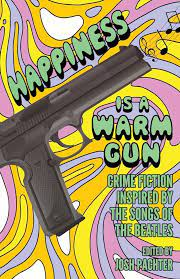
Happiness is a Warm Gun, subtitled Crime Fiction Inspired by Songs of the Beatles, is a new anthology edited by Josh Pachter and published by Down and Out Books. I'm one of the contributors, so I can't write an impartial review - this post is simply a celebration of a book that I'm delighted to be part of. It's the second anthology edited by Josh that I've contributed to, following a book of stories inspired by the songs of Paul Simon, Paranoia Blues.
Josh is a notable editor and writer of short stories. I first came across his name back in the 1980s, long before I was published, when I borrowed from Moreton Library his excellent anthology Top Crime. Many years later we met, introduced as far as I can recall by our mutual friend Janet Hutchings, editor of Ellery Queen's Mystery Magazine. Both Josh and I had our first stories published in EQMM, the difference being that Josh was a mere 16 when he made that great breakthrough. We've kept in touch ever since and it's always a pleasure to spend time with him and his wife Laurie.
When Josh mentioned to me the possibility of a Beatles-themed anthology, I was very keen to take part, especially given that - as I never tire of telling people! - I am not only a Beatles fan (and former lawyer to the Cavern Club!) - I once saw them live, improbably opening Northwich Carnival. I was lucky enough to have a lightbulb moment straight away. It concerned a story inspired by 'She's Leaving Home', which is really one of the greatest Beatles songs (my all-time faves are 'The Long and Winding Road' and 'Eleanor Rigby', a line from which supplied the title of my first novel, All the Lonely People). My story is quite a dark one, but I enjoyed writing it and I like to think it's one of my better efforts.
As usual, Josh has gathered an interesting and eclectic group of contributors. They include Paul Charles (himself a great music man), Christine Poulson, Vaseem Khan, Tom Mead, and Kate Ellis from the UK. The American authors include Robert Lopresti and Michael Bracken, both of whom I enjoyed chatting to at the San Diego Bouchercon. And a special treat is a debut mystery by two pillars of the blogging world, Dru Ann Love and Kris Zgorski. Their story is 'Ticket to Ride' and I very much hope that this success will encourage them both to keep writing fiction as well as blogging and everything else they do in the mystery world.
January 5, 2024
Forgotten Book - The Eternal Journey

There is no doubt that The Eternal Journey, a novel of 1930, is a forgotten book. I've not found a single review, nor any analysis of the story in a reference book or online. Nothing too unusual in that, except that the author was famous enough to be honoured with a blue plaque on her former home in Abergavenny. Yes, I'm referring to Ethel Lina White.
This was White's third novel. It followed The Wish-Bone (described by one reviewer as 'a charming little romance') and Soon 'Twill Be Dark ('the love interest is strong') and although there is quite a lot of romance in the story, it's probably best described as a cross-genre novel, with elements of the supernatural and also fantasy. The first section is set in 1794 and the third in 2331 (that's not a misprint!) - these shortish segments sandwich the main body of the book, a contemporary story set in 1930.
I don't want to say too much about the story for fear of ruining it, but it begins promisingly from the crime fan's point of view. The second sentence on the first page, which follows a paragraph introducing a young woman called Ursula Pike reads: 'She had committed murder.' This is not in any sense, however, a conventional mystery novel.
This book marks, I think, a significant stage in White's development as a novelist. She was moving beyond the conventional romance-dominated story to a more ambitious style of writing. There are some interesting musings on the role of women in society, and it's striking that the male characters are much less engaging than the female leads. Women consistently take centre stage in White's fiction. Her next book was Put Out the Light, which clearly qualifies as crime fiction. I don't claim that The Eternal Journey is in any way a masterpiece - I think that White had an unusual idea for a story which she executed imperfectly. But I definitely found this novel intriguing and I'm glad I read it.
January 3, 2024
New Year, New Writing

A very happy New Year to all readers of 'Do You Write Under Your Own Name?' I hope you've had an enjoyable and refreshing break over the festive season. I've done plenty of writing, and in due course I look forward to talking in more detail about what I've been up to. But I've also had plenty of time off!
Among other things, I followed a very good recommendation from Bethan, my lovely editor at Head of Zeus/Aries and indulged in a couple of games of Cryptic Killers. I'll probably write more about this another day, but basically it's an update of the old Wheatley/Links crime dossiers, and it's very well done.
I've also watched a variety of good things, including Red Joan, starring Judi Dench. A Ghost Story for Christmas is a long-time favourite of mine and I enjoyed catching up with one I'd missed, A View from a Hill, which dates from 2005 and was based on a story by M.R. James. This year's story (see the above photo of the actors) was an adaptation by Mark Gatiss of Arthur Conan Doyle's Lot No. 249 and it was very entertaining. A striking new element was introduced into the storyline which may be controversial to some, but I felt it was appealing and well done.
There was also what promised to be an interesting new element in the latest version of Murder is Easy. It's in the nature of adaptations that changes have to be made to the source material. Furthermore, there's not much point, in my opinion, in doing the same-old, same-old thing with the work of famous writers who have already been extensively adapted. This Christmas, I've reacquainted myself with the films of Evil under the Sun and Death on the Nile, both starring Peter Ustinov as an unlikely Poirot, and the original The 39 Steps starring Robert Donat. All of them hold up pretty well. The key to the success of an adaptation is that the script is capably written - for instance, the Ustinov films were written the gifted Anthony Shaffer. Unfortunately the reviews of Murder is Easy that I've read have been scathing.
'Doing it well' is a reason why I think it's important for writers not to prioritise quantity over quality. I've been working very busily on my writing in recent times and that's set to continue for a while to come. But I'm very keen to have breaks every now and then, so as to keep my writing fresh, and I've more or less managed to stick to my principles on this. I'm looking forward to what 2024 holds in store, and I do hope to meet some of you, the readers of this blog, during the course of the next twelve months. And please keep your comments and emails coming!
December 31, 2023
2023 - People
I've had the chance to spend quality time with some wonderful people during the past twelve months. It's impossible to mention everyone, let alone create some kind of artificial hierarchy. So here, in no particular order, are some photos which serve as reminders of a fantastic year. And whether we've met in person or been in touch some other way, can I thank all of you who have contributed to my happiness this year. Here's to 2024!

The great Peter Lovesey. This picture recalls a lovely day spent with him and Jax in Shrewsbury.
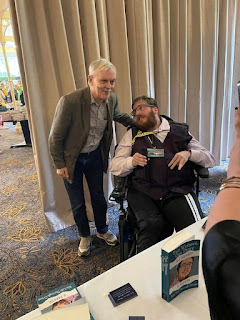
I had a great time at Harrogate this year and one of many highlights was attending Alex Hawley's book launch.

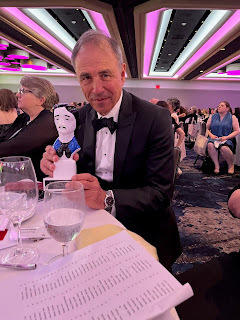
A night to remember in New York City. Here's Jennifer Dee, with my Edgar, and Anthony Horowitz with his.

The Road Scholar gang, outside the Radcliffe Camera. A wonderful trip.
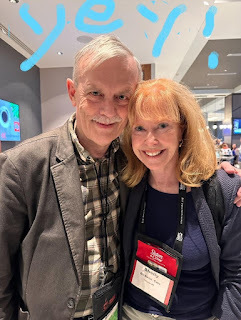
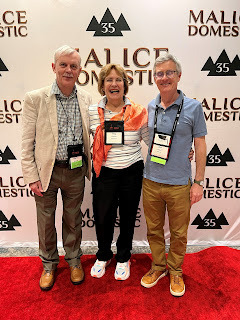
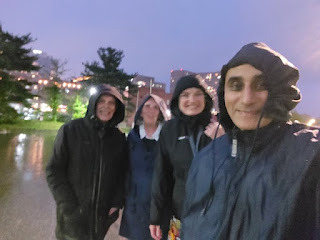
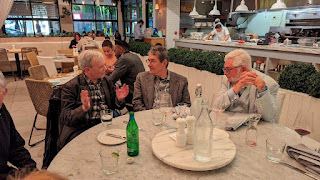
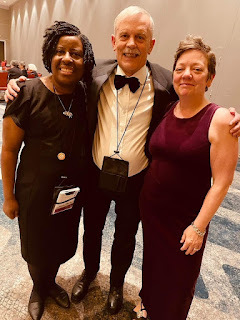
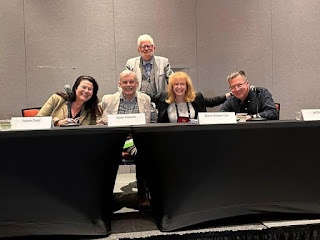
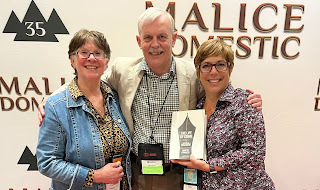
Pictures from Malice Domestic. I love that photo of Vaseem Khan, Ann Cleeves, Catriona McPherson and me in rain that made Washington DC seem like Manchester at its worst!

A glorious evening in Croatia with Helena, Kate Ellis, and Roger Bullock.
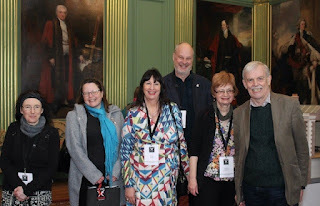
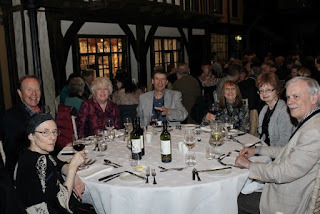
The CWA conference in York with Linda Stratmann, Michael Ridpath, Keith Miles, Judith Cutler and Vickie Goldie among others.
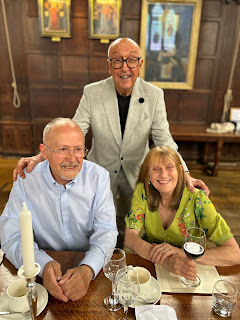
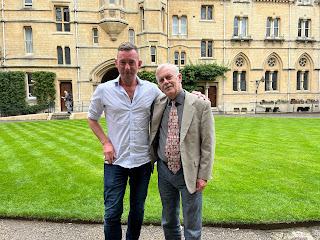
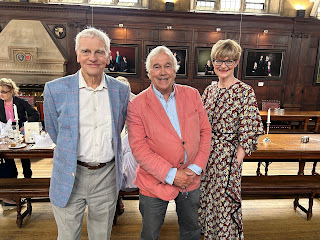
The Detection Club's summer lunch, with David Stuart Davies, Russell James, Kate Ellis, Ragnar Jonasson, Peter Lovesey, Simon Brett, and Kathryn White.
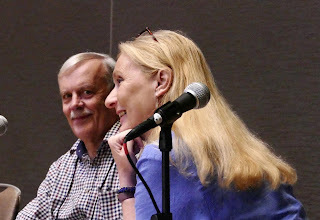

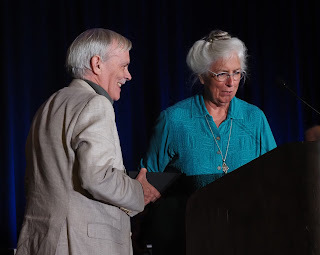

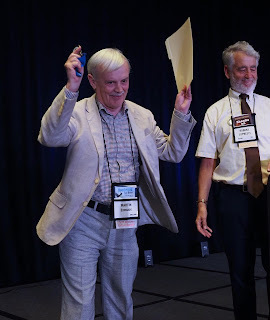
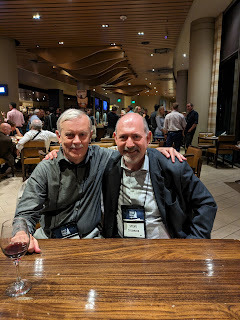
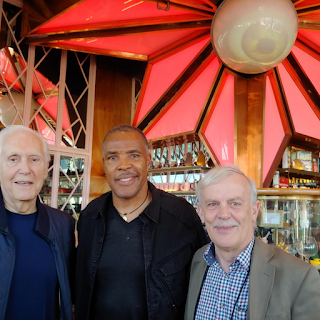
Magic moments from San Diego with some more delightful people, not least the gang from Sourcebooks, my American publishers. And speaking of magic moments, here's someone we lost in 2023 whom I never met but whose music continues to give me so much pleasure. Gone but not forgotten!
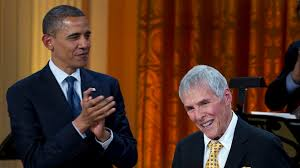
December 30, 2023
2023 - Places

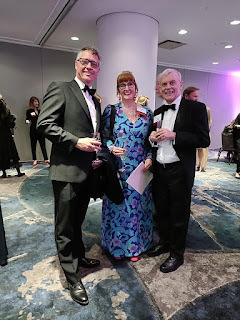
One of many highlights in 2023 was a quick trip to New York City in April. A party hosted by Ellery Queen's Mystery Magazine preceded the Edgar Awards ceremony, where I met up with a number of old friends, including Robert Thorogood and Donna Moore (pictured above), and Otto Penzler, as well as meeting some delightful people such as Tom Straw and Joe Goodrich for the first time. With my publicist Jennifer, I was on the same table as Anthony Horowitz, and the moment when The Life of Crime was announced as the Edgar winner was one of the greatest of my career. The same trip also included a visit to Malice Domestic and a memorable dinner with a number of good friends including Jeffrey Marks, Michael Dirda, and Steve Steinbock.
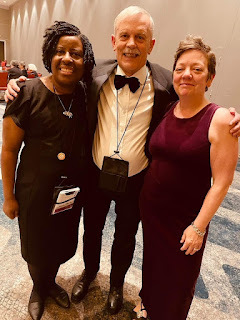

Not long after that, I was back in New York City again, this time as a precursor to a lecture crossing on the Queen Mary 2, followed by five days with our lovely group of crime fans in Oxford.
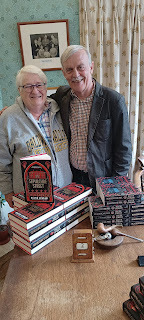

Speaking of Oxford, I had three other trips there. The first saw Team Balliol invited to a dinner by the Master, Dame Helen Ghosh, to celebrate becoming series champions in Christmas University Challenge. A truly memorable night. And so was the occasion of the Snell Dinner in the college, when we were guests of the Domestic Bursar and met such luminaries as the current head of MI5. Finally there was a Detection Club lunch in July which was blessed with wonderful weather and great company (can you spot Mick Herron, Ragnar Jonasson, Peter Lovesey, Len Tyler, Simon Brett, and Cynthia Harrod-Eagles amongst others in the photos below?)
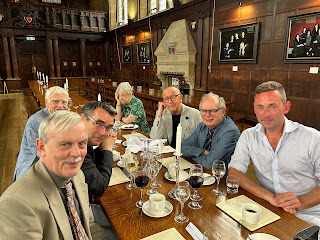
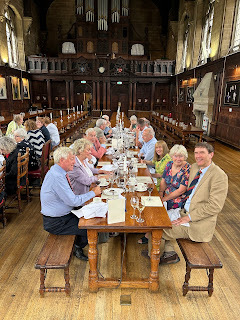
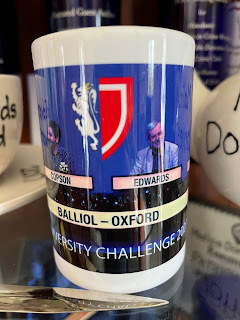
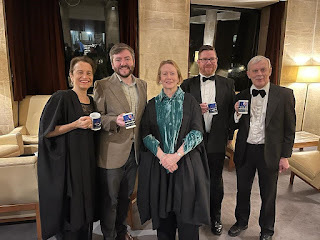
There were festivals and conferences at places such as Gladstone's Library, the British Library, Berwick, and - very excitingly - Shetland, which I had the chance to visit and explore for the very first time - with Ann Cleeves doing some great work as tour guide and driver with lots of local knowledge!

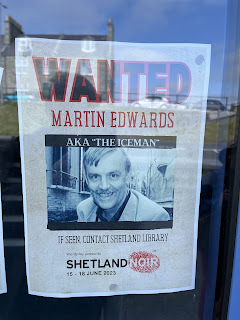

I organised a month-long exhibition on crime fiction for Warrington Libraries, which went so well that there will be fresh versions of it at various venues in 2024. One of the other libraries I enjoyed visiting was Bromley House in Nottingham.
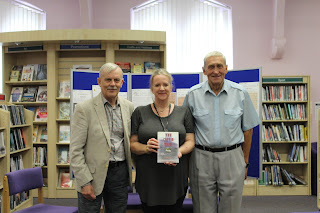
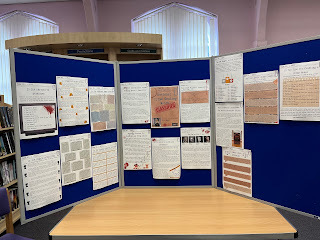
CrimeFest was fantastic as always. I took part in three panels with the likes of Mark Billingham, Vaseem Khan, and Simon Brett, and our team won the pub quiz. The icing on the cake came at the gala dinner when The Life of Crime won the HRF Keating award.
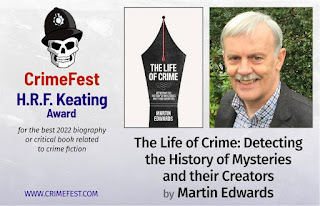
And then there was San Diego, which might just have become my favourite city in the United States. Bouchercon was unforgettable, not least because I received the Golden Derringer for my short fiction and the Anthony award for The Life of Crime. There were so many other good moments, both during the convention and when exploring the city and neighbouring La Jolla.
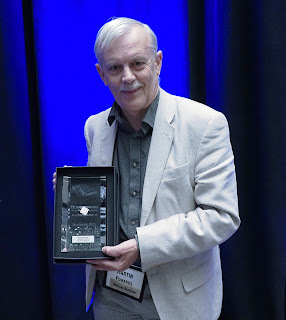


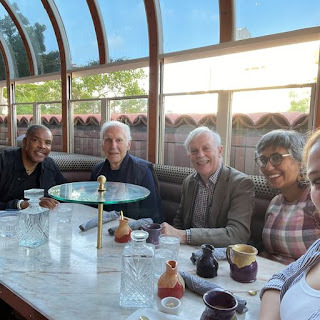

This year's CWA conference was held at York, one of my favourite cities in the UK, and as well as various events there was time for a boat trip on the Ouse. A few weeks earlier, I'd been interviewed in the city library to launch the local book festival, and during the conference both Blackstone Fell and The Life of Crime were announced as nominees for CWA Daggers.
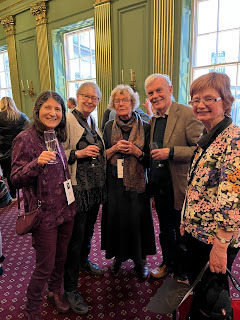
Naturally, I focus on this blog on crime-writing-related stuff, but one especially relaxing holiday involved a yacht trip around the islands of Croatia in the company of Kate Ellis and her husband. And a great birthday sailing down the Thames to Greenwich in glorious sunshine. So many lovely places, so many happy occasions. Writing this post on a wet, rather miserable day in the depths of December has been a real tonic! And I suppose that's a key truth about this blog - I want it to please and entertain readers, but it also does me a lot of good too 😀😀








December 29, 2023
2023 - Publications
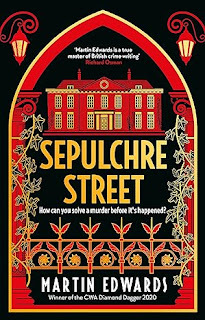
The past twelve months have been wonderful for me, and I'm very grateful for my good fortune. In terms of published work, the highlight was the appearance of Sepulchre Street, which earned plenty of nice reviews. The US edition, retitled The House on Graveyard Lane (but it's the same book, with a few tiny changes to make sense of the title!) comes out next year.
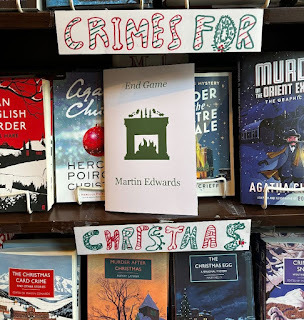
'End Game', as I mentioned the other day, was a short story for Christmas commissioned by the Mysterious Bookshop in New York. Other short stories I published this year were 'The Intruder', in School of Hard Knox, and 'She's Leaving Home', in Happiness is a Warm Gun. After a glitch in the original publication of 'No Peace for the Wicked' (when the end of the story was omitted in EQMM!) the full version of the story was finally published, much to my relief. I'm hoping this will also appear in an EQMM anthology next year.
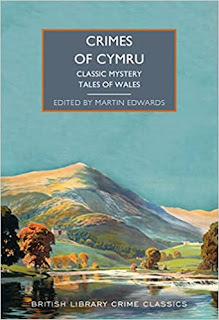
Each month, a new British Library Crime Classic has appeared with an introduction that I've written. And two of the books have been anthologies I've edited, Crimes of Cymru and Who Killed Father Christmas? The former was a bestseller in Wales, I've been told, and the latter had a great run during the festive season. And there was also a lengthy intro for an American Mystery Classic, Obelists at Sea.
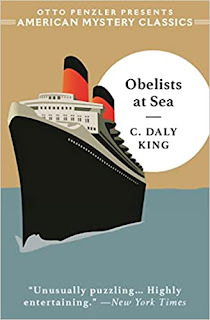
This has been the best year of my career in terms of translations of my books into foreign languages. Different books have appeared in different territories and, overall, they are currently to be found in German, Italian, Spanish, Hungarian, Japanese, Chinese, and Korean, with a Taiwanese translation in the works and other languages under negotiation. Even though I can't read the translations (I even struggle with German nowadays, it's so long since I studied it), I do find this quite exciting.
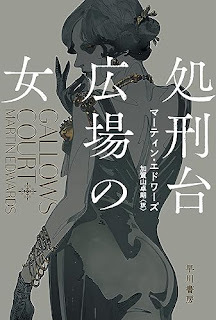
But a book is nothing without readers. I've had many messages from readers around the world this year and their support is tremendously important. At present I'm extremely busy, working on a number of different projects, and when at the end of a long day I may feel a bit tired, there is nothing more motivating than reading some of these positive messages. So thank you, and do keep in touch.
December 28, 2023
The Best UK Crime Fiction Blogs
I received a pleasant message yesterday to tell me that this blog features on a new list of 'the top 30 UK Crime Fiction Blogs' and in fact it's number 4 on the list
The top ten blogs on the list are:
1. Crime Fiction Lover
2. Crimespree Magazine
3. The CWA website
4. Do You Write Under Your Own Name?
5. Shots
6. The Telegraph - Crime Fiction
7. Damppebbles
8. Crime Book Junkie
9. Crime Time
10. Euro Crime.
Nice company to be in! I'm not entirely sure how these things are measured - apparently various criteria are taken into account - but it's a very gratifying surprise. So is the fact that, so far this month, there have been more than 65,000 page views. I think this may be the highest figure ever. I don't check these figures regularly, but I can't recall a higher number. Why the blog, after all the years, is doing quite so well at present, is something that again I'm far from clear about. Rather than analyse it too much, I'm happy to see that people still seem to be enjoying what I do. Rest assured, I'll continue to do it for as long as I keep enjoying it.
I've been asked from time to time about which crime fiction blogs I enjoy most. It's a selective list, because I don't have a lot of time to explore the internet randomly, so I'm sure I miss plenty of good stuff. But here are some excellent blogs, well worth your attention. They all have the important ingredient of a pleasant personality, something that makes a big difference, in my opinion. And I list them in no particular order, not least because I've probably missed out some I meant to include, for instance those run by the people who have kindly taken part in my various blog tours over the years. And since starting work on this post, I've been reading some very interesting material on the Collecting Christie blog, which is more specialised than those mentioned below, but very well-researched. If you take a look at these for starters, you won't go far wrong.
UK
The Invisible Event (Jim Noy)
Cross Examining Crime (Kate Jackson)
The Venetian Vase (Steven Powell)
In Search of the Classic Mystery (Steve Barge)
A Reading Life (Chrissie Poulson)
Clothes in Books (Moira Redmond)
France
At the Villa Rose (Xavier Lechard)
Italy
Death Can Read (Pietro de Palma)
Spain
A Crime is Afoot (Jose Ignacio Escribano)
US etc,
Pretty Sinister Books (John Norris)
The Rap Sheet (Jeff Kingston Pierce)
The Bunburyist (Elizabeth Foxwell)
Mystery*File (various)
Mysteries Ahoy!
The Grandest Game in the World (Nick Fuller)
Beneath the Stains of Time
December 27, 2023
CADS 91

I hope your Christmas festivities were enjoyable and that you're continuing to make the most of the holiday season. Among other things, I've tried out the Cryptic Killers game (excellent), watched the latest Vera and the oldest Death on the Nile and generally consumed more chocolates than are good for me - but at least none of them were poisoned...
Meanwhile, the arrival through the post of the latest issue of Geoff Bradley's 'irregular magazine of comment and criticism about crime and detective fiction', is always a cause for joy. However, the publication of CADS 91 is also tinged with sadness, as Geoff has announced that issue 92 will be the last. It's a shame that CADS won't reach its century, but it's been a very fine innings indeed. Geoff has produced the magazine for 38 years, an astonishing length of time, and he deserves the thanks of all mystery fans - in particular those with a taste for the Golden Age - for his hard work and the quality of the material he has consistently assembled. It's a wonderful achievement.
CADS 91 is, as always, a great read. The contributions are varied and always interesting, and the contributors include some of the most knowledgeable enthusiasts around, including Michael Wilson, Robert Smith, Liz Gilbey, Jamie Sturgeon, Arthur Robinson, Philip Scowcroft, Clint Stacey, Philip Gooden, B.A. Pike, John Cooper, Kate Jackson, and Geoff himself. One notable absentee, alas, is the late Marvin Lachman, the subject of an excellent tribute by Geoff.
One article of particular interest to me, naturally, was Melvyn Barnes' excellent study of the British Library's Crime Classics series. I was also truly delighted to see two of my own novels included in John Cooper's 'The Best Detective Novels I Have Read'. They keep some company with some wonderful books, and the fact that the two novels John highlights are Harry Devlin cases (Yesterday's Papers and The Devil in Disguise) is gratifying. I am, of course, excited about my more recent books, but it's incredibly rewarding to think that my earlier efforts still find favour.
There are lots of good things in this issue, and if you're a fan of classic crime and you're not familiar with CADS, I do encourage you to take a look. Some back issues are still available from Geoff. As regards my own contributions, they are a couple of shortish pieces in this issue, originally conceived as a single piece, about 'Criminal Associations' - the stories behind a couple of the inscribed books in my personal collection, one by Celia Fremlin and the other by Marie Buchanan.
Finally, a special word of thanks from me to Colin Edwards, who kindly supplied me with his index to the contents of CADS over the years - a really helpful guide to a magazine that is both informative and entertaining to read. CADS may be coming to an end, but I've got no doubt I shall continue to refer to back issues for the foreseeable future.

